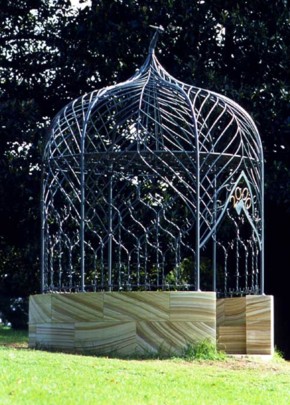Ned Kelly
Today historical films provide a two hour thumb nail sketch of the past that is usually even more imaginative than researched historical novels. These often capture and mould the popular conception of the past. Thus Peter O'Tool is Laurence of Arabia; Ben Kingsley is Ghandi; and so on.
Was Ned Kelly a common horse thief and murderer or an Irish hero?
What actually happened determined the present; what happened to you today; the birth and lives of children; the present not just of Australia but by now, of the entire world.
The story, and the historical controversy, is known only to a few Australians and even less, rather confused, overseas fans of Mick Jagger; Heath Ledger or Peter Carey.
The Kelly story is very well documented. It was followed closely by contemporary newspapers; documents such as the famous Jerilderie Letter were dictated by Kelly in front of reliable witnesses; and there were two trials for which a vast amount of evidence was collected, prior to his execution in Melbourne Jail.
Yet the 2003 Gregor Jordan film, with Orlando Bloom and Heath Ledger, is such an imaginative retelling incorporating: a circus; a desert survival by drinking horse blood; a squatter's wife as mistress; a bushfire; and numerous other embellishments to provide 'a love interest' and a 'fresh look at an old story'; that it should have carried a warning that nothing in the film relates to the actual events.
There was no circus, except that Kelly's sister later became a sideshow attraction; there is no desert in the vicinity; and trackers had trouble following Kelly due the torrential rain, as it was particularly wet at the time.
Kelly was an Australian born illiterate who was a victim of history; the stories told at his mother's knee. He had a passionate sense of Irish identity strengthened by his marginalised family and associates.
According to Kelly's dictated Letter, Irish Australians were:
...transported to Van Diemand's Land to pine their young lives away in starvation andmisery among tyrants worse than the promised hell itself all of true blood bone and beauty, that was not murdered on their own soil... were doomed to Port Mcquarie Toweringabbie norfolk island and Emu plains and in those places of tyrany and condemnation many a blooming Irishman rather than subdue to the Saxon yoke Were flogged to death and bravely died in servile chains but true to the shamrock and a credit to Paddys land...
The family were well known locally as horse thieves. Kelly spent periods in jail from the age of 17 onwards. He grew to become a large man who dominated his mother's large family and those around him, including those better educated. As he made clear in the Jerilderie Letter, above all he disliked, or hated, Irish Australians who supported the establishment.
..and is my brothers and sisters and my mother not to be pitied also who has no alternative only to put up with the brutal and cowardly conduct of a parcel of big ugly fat-necked wombat headed big bellied magpie legged narrow hipped splaw-footed sons of Irish Bailiffs or english landlords which is better known as Officers of Justice or Victorian Police... A Policeman is a disgrace to his country, not alone to the mother that suckled him, in the first place he is a rogue in his heart but too cowardly to follow it up without having the force to disguise it. next he is traitor to his country ancestors and religion as they were all catholics before the Saxons and Cranmore yoke held sway since then they were perse cuted massacreed thrown into martrydom and tortured beyond the ideas of the present generation...
The story of the killings for which he was hanged, revolves around what happened when four police attempted to find and arrest him. Possibly it was self defence. This is what he claims in The Jerilderie Letter. But the outcome was three Irish police lay dead and the Scotsman was allowed to go free. Kelly denies that it was he who handcuffed Kennedy to a tree and tortured him. He says this must have been done after Kennedy's death and the Kelly gang leaving the scene.
The initial killings were then compounded by additional and attempted crimes, including attempted murder.
At his trial Kelly admitted that the attempted train derailment and associated ambush at Glenrowan was specifically aimed at stopping the 'black trackers' he feared would successfully hunt him down. But he may not have considered killing 'black trackers' to be murder.
The Jerilderie Letter is a classic attempt to tell the story of events from a particular perspective. Largely as a result of it, during the hunt for the gang, then at his trial, he became a rallying point for anti-establishment, Irish and Catholic sentiment across Australia. Ned had become a folk hero; the focus of an unlikely legend that grew ever stronger after his death.

